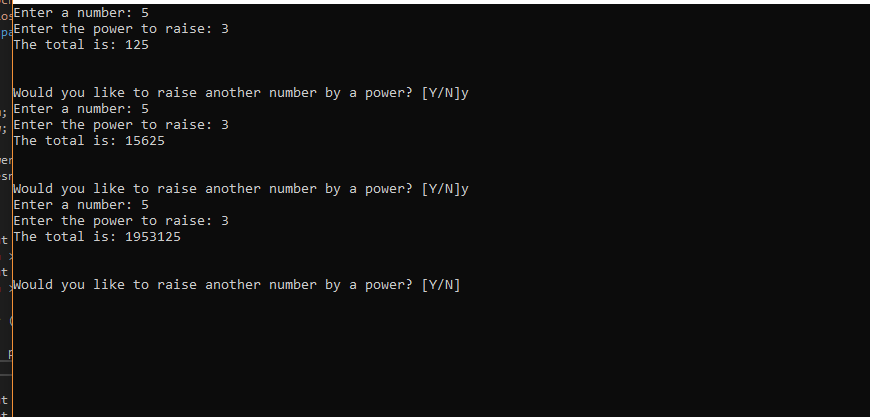целое число — общее число C ++ продолжает расти
Здравствуйте, это моя первая программа с циклом do-while, и мне потребовалось немало времени, чтобы ее отключить. Мне нужно, чтобы пользователь ввел 2 числа и поднял первое число до второго. Я наконец получил код, чтобы спросить, «хотели бы они поднять еще одно число на степень?» и когда они говорят «да» и вводят 2 новых числа, к сумме прибавляется сумма из первых 2 чисел, введенных со вторым набором чисел, и так далее. Может кто-нибудь помочь мне с этой проблемой? Вот код и картинка, чтобы помочь вам!
#include <iostream>
using namespace std;
int main()
{
int num;
int pow;
int p;
int power = 1;
char yesno = 'y' || 'Y';
do
{
cout << "Enter a number: ";
cin >> num; "\n";
cout << "Enter the power to raise: ";
cin >> pow; "\n";
for (p = 1; p <= pow; p++)
{
power = power * num;
}
cout << "The total is: " << power << endl;
cout << "\n\n";
cout << "Would you like to raise another number by a power? [Y/N]";
cin >> yesno;
} while (yesno != true);
}
Решение
Проблема постоянно растущего ответа заключается в том, что power не сбрасывается в цикле do-while, поэтому последнее значение переносится в следующий цикл. Вам нужно сбросить его в верхней части цикла.
Другая проблема с кодом заключается в том, что условие выхода никогда не возникнет.
Попробуйте это вместо этого:
int main()
{
int num;
int pow;
int p;
int power;
char yesno;
do
{
power = 1; // <<<<<< reset power here
cout << "Enter a number: ";
cin >> num; "\n";
cout << "Enter the power to raise: ";
cin >> pow; "\n";
for (p = 1; p <= pow; p++)
{
power = power * num;
}
cout << "The total is: " << power << endl;
cout << "\n\n";
cout << "Would you like to raise another number by a power? [Y/N]";
cin >> yesno;
} while (yesno == 'y' || yesno == 'Y'); // <<<<< test for 'yes' response
}
Другие решения
Когда вы достигнете линии } while (yesno != true); и вернуться к do {переменная power все еще держит предыдущий num^pow, Вам нужно будет назначить power = 1 после do {,
#include <iostream>
// you also need
#include <cmath> // for pow()
using namespace std;
int main()
{
// int num; Declare variables where they're used. As locally as possible.
// int pow;
// int p;
// int power = 1;
// char yesno = 'y' || 'Y'; I don't know what you were trying to do here
// the expression 'y' || 'Y' will always be true
// and evaluate to some value different from null
// wich will be assigne to yesno. But with no con-
char yesno; // sequences since it later gets overwritten by
do // cin >> yesno; There is no need to initialize
{ // this variable.
cout << "Enter a number: ";
int num;
cin >> num; "\n"; // the statement "\n"; has no effect.
cout << "Enter the power to raise: ";
int pow;
cin >> pow; "\n"; // again. no effect.
// for (p = 1; p <= pow; p++) as user4581301 has pointed out in the
// comments it is more ... natural in C
// to loop from 0 to < max:
int power = 1; // now its time to declare and define power ;)
for(int p = 0; p < pow; ++p) // notice that you can declare variables
{ // in the init-statement of a for-loop
// power = power * num; shorter:
power *= num;
}
cout << "The total is: " << power << /* endl; + 2 x '\n' gives: */ << "\n\n\n";
// cout << "\n\n";
cout << "Would you like to raise another number by a power? [Y/N]";
cin >> yesno;
// } while (yesno != true); that condition will most likely always be true
// since the user would have a hard time to input
// a '\0' character, which would evaluate to false
// better:
} while(yesno == 'y' || yesno == 'Y' );
}
сделанный.
Без беспорядка:
#include <iostream>
#include <cmath>
using namespace std;
int main()
{
char yesno;
do {
cout << "Enter a number: ";
int num;
cin >> num;
cout << "Enter the power to raise: ";
int pow;
cin >> pow;
int power = 1;
for(int p = 0; p < pow; ++p)
power *= num;
cout << "The total is: " << power << "\n\n\n";
cout << "Would you like to raise another number by a power? [Y/N]";
cin >> yesno;
} while(yesno == 'y' || yesno == 'Y' );
}

